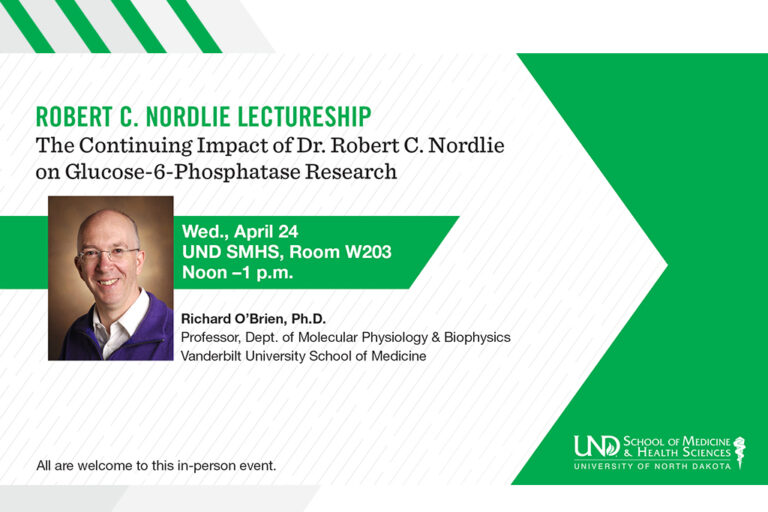NIH selects Geiger to chair a second vital grant review study section
 The National Institutes of Health (NIH) has selected Chester Fritz Distinguished Professor Jonathan D. Geiger, PhD, in the Department of Biomedical Sciences at the University of North Dakota School of Medicine & Health Sciences (SMHS), to serve as the chair of the HIV Co-Morbidities and Clinical Studies (HCCS) grant review study section for the NIH’s Center for Scientific Review (CSR).
The National Institutes of Health (NIH) has selected Chester Fritz Distinguished Professor Jonathan D. Geiger, PhD, in the Department of Biomedical Sciences at the University of North Dakota School of Medicine & Health Sciences (SMHS), to serve as the chair of the HIV Co-Morbidities and Clinical Studies (HCCS) grant review study section for the NIH’s Center for Scientific Review (CSR).
This is the second NIH study section that Geiger has chaired. Previously, he was the chair of the NeuroAIDS and Other End-Organ Disease (NAED) study section.
This year the NIH CSR reorganized all of its nine HIV/AIDS study sections into six study sections. The HCCS is a brand new study section that will review NIH grant submissions on organ diseases commonly seen, including: cardiomyopathy, renal disease, liver disease, pulmonary dysfunction, neurocognitive and neurological disorders, metabolic complications, and diabetes. The study section also reviews applications involving clinical studies of HIV and aging; clinical management of symptoms; and disease progression in children, pregnant women, adults, and other defined cohorts.
“Dr. Geiger’s selection is a significant recognition of excellence,” noted SMHS Dean Joshua Wynne, MD, MBA, MPH. “He has served on over 120 such study sections during his career and has chaired dozens of meetings where he gets to interact with some of the very best scientists nationwide and gets to read some impressive applications for grant funding.”
The NIH is the nation’s medical research agency and the largest source of funding for medical research in the world. The UND SMHS has more research funding from the NIH than any other single source. Study sections review grant applications submitted to the NIH, make recommendations on these applications to the appropriate NIH national advisory council or board, and survey the status of research in their fields of science. These functions are of great value to medical and allied research in the United States.
The CSR organizes the peer-review groups or study sections that evaluate 70 percent of the research grant applications sent to the NIH. The CSR’s peer-review system has enabled the NIH to fund fundamental, cutting-edge research that has led to new therapies for a variety of health conditions.
“This is a very special honor for me because few people serve as grant review study section chairs,” Geiger said. “The confidence placed in my leadership abilities almost certainly comes from a recognition by my peers and by the NIH that I have sound scientific judgment and that I understand how essential honesty, passion, and integrity are to the grant review process. This adds a tremendous amount of work to my already busy workload, but interacting with my peers serving on this study section is enlightening, informative, and incredibly educational. Serving on these committees is something that I look forward to and value greatly.”



